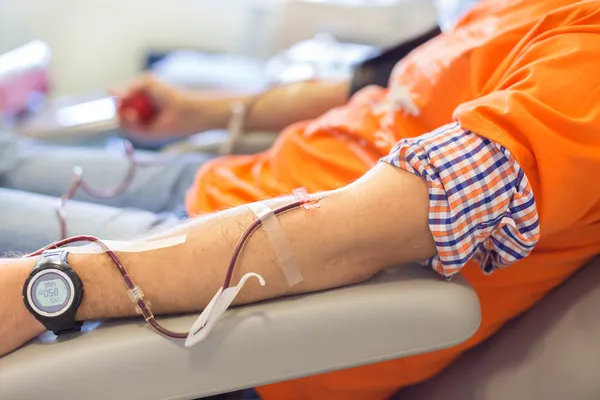Intravenous Iron Infusion Before Colorectal Surgery Reduces Need for Blood Transfusion, Study Finds
Colorectal surgery is a surgical procedure that is performed on the colon and rectum. The colon is the last part of the large intestine, and the rectum is the last part of the digestive tract. Colorectal surgery is performed to treat a variety of conditions, including:
- Colorectal cancer
- Inflammatory bowel disease (IBD), such as Crohn’s disease and ulcerative colitis
- Diverticulitis, which is an inflammation of the diverticula, which are small pouches that form in the wall of the colon
- Hemorrhoids, which are swollen veins in the rectum and anus
- Anal fissures, which are small tears in the lining of the anus
- Fistulas, which are abnormal connections between the rectum or anus and other organs or tissues
- Abscesses, which are collections of pus in the tissues around the rectum or anus
Colorectal surgery is typically performed by a colorectal surgeon, who is a doctor who has specialized in the diagnosis and treatment of diseases of the colon and rectum. The type of surgery that is performed will depend on the condition being treated. Some common types of colorectal surgery include:
- Colectomy: This is the removal of a part of the colon.
- Proctocolectomy: This is the removal of the entire colon and rectum.
- Ileostomy: This is the creation of an opening (stoma) in the abdomen that allows stool to pass out of the body.
- Colostomy: This is similar to an ileostomy, but the stoma is created in the colon.
- Anastomosis: This is the surgical connection of two parts of the intestine.
Colorectal surgery can be performed using a variety of techniques, including:
- Open surgery: This is the traditional type of surgery, in which a large incision is made in the abdomen.
- Laparoscopic surgery: This is a minimally invasive type of surgery, in which several small incisions are made in the abdomen and a laparoscope (a thin, lighted tube with a camera) is inserted to guide the surgeon.
- Robotic surgery: This is a type of laparoscopic surgery in which a robot is used to assist the surgeon.
The recovery time from colorectal surgery will vary depending on the type of surgery that is performed. In general, patients will need to stay in the hospital for 5 to 7 days after surgery. They will also need to take several weeks to recover fully.
Here are some of the potential risks of colorectal surgery:
- Infection
- Bleeding
- Blood clots
- Damage to nerves or blood vessels
- Hernia
- Scarring
- Recurrence of the condition being treated
Overview of the new research concerning Colorectal surgery
Researchers at UCL and the Royal Devon and Exeter Hospital have found that giving iron intravenously before colorectal surgery can significantly reduce the need for blood transfusions. Their meta-analysis of five randomized controlled trials, published in The British Journal of Surgery, showed that patients who received iron infusion were 33% less likely to require a blood transfusion during or after surgery. This is the first time that clinical trials have shown a patient benefit from treatment with an iron infusion before surgery.
Anaemia is a common problem in patients undergoing bowel surgery and is associated with feeling tired and unwell, a slower recovery, and other complications after surgery. Blood transfusion is used to treat anemia, but there have been concerns that colorectal cancer patients may have higher rates of complications and cancer recurrence if they receive a blood transfusion.
Prior to this study, intravenous iron infusion had been used sparingly in patients undergoing bowel surgery. This analysis suggests that treating patients with intravenous iron before major surgery could reduce the need for blood transfusion and improve patient outcomes.
Key Findings:
- Intravenous iron infusion reduces the need for blood transfusion by 33% in patients undergoing colorectal surgery.
- This is the first time that clinical trials have shown a patient benefit from treatment with an iron infusion before surgery.
- This finding has the potential to improve outcomes for patients undergoing colorectal surgery, the second most common cause of cancer mortality in the UK.
Implications:
- The findings of this study could lead to a change in clinical practice, with more widespread use of intravenous iron infusion before colorectal surgery.
- This could reduce the need for blood transfusions and improve patient outcomes.
- This could also help to alleviate blood supply shortages in the UK.
Quotes from Study Authors:
Professor Toby Richards, senior author of the study from UCL Division of Surgery & Interventional Sciences: “With over 20,000 major colorectal cancer resections per year in the UK, the findings of this study have the potential to improve outcomes for the second most common cause of cancer mortality. In the past, surgeons were uncertain whether the benefits of iron infusion could be realized in the short time frames of cancer care and consequently the uptake of this treatment was limited. Our findings show that improved outcomes can be achieved if iron infusion is given in the period between cancer diagnosis and surgery.”
Professor Neil Smart, colorectal surgeon from the Royal Devon and Exeter Hospital and co-lead of the study: “Our findings show that improved outcomes can be achieved if iron infusion is given in the period between cancer diagnosis and surgery.”
Sue Pavord, Vice President of British Society for Haematology: “This analysis shows a reduction of over one-third in blood transfusions when anaemic patients are treated with intravenous iron before their colorectal surgery. If we could combine this insight with others from the previous PREVENTT study, then hospital readmissions could potentially be cut even more, which would be important for both patients and the NHS.”
Continue to check our website for more articles of this kind. And, please use our comment section as well, we would love to hear from you.








